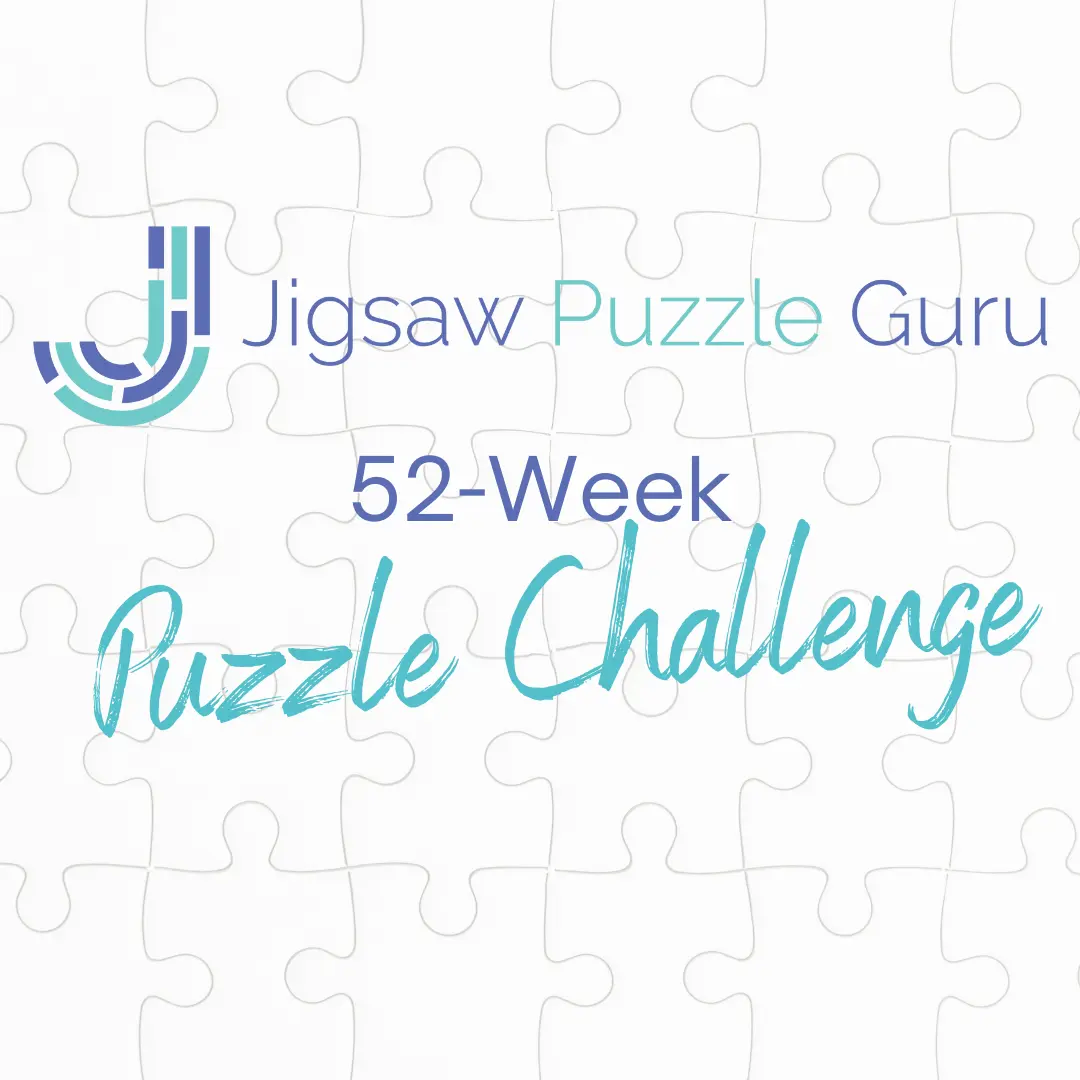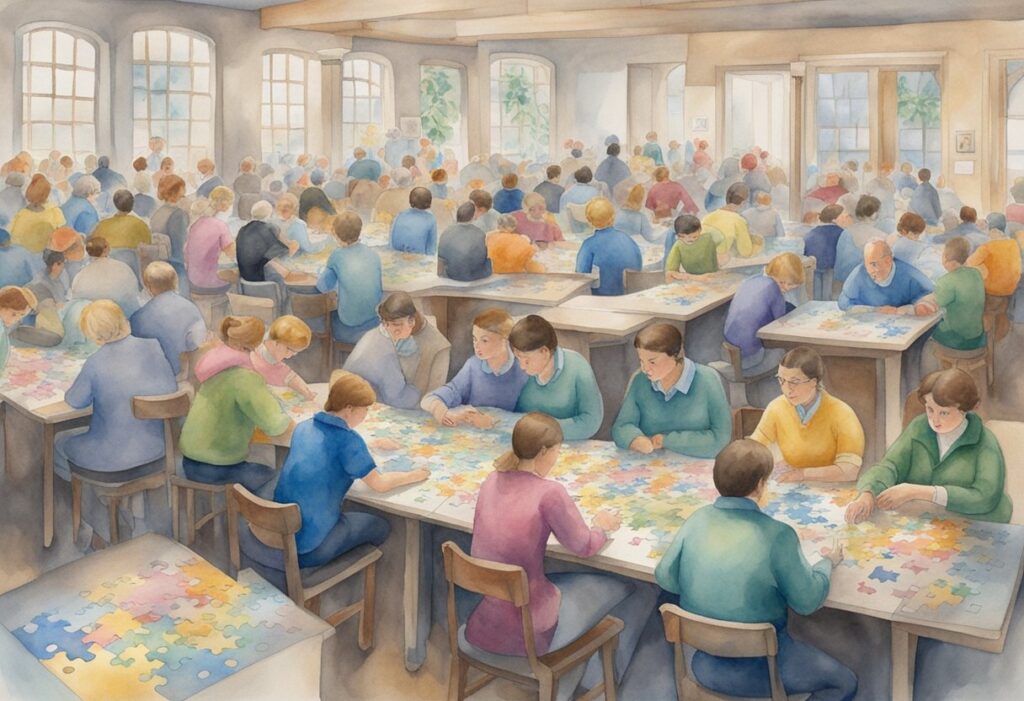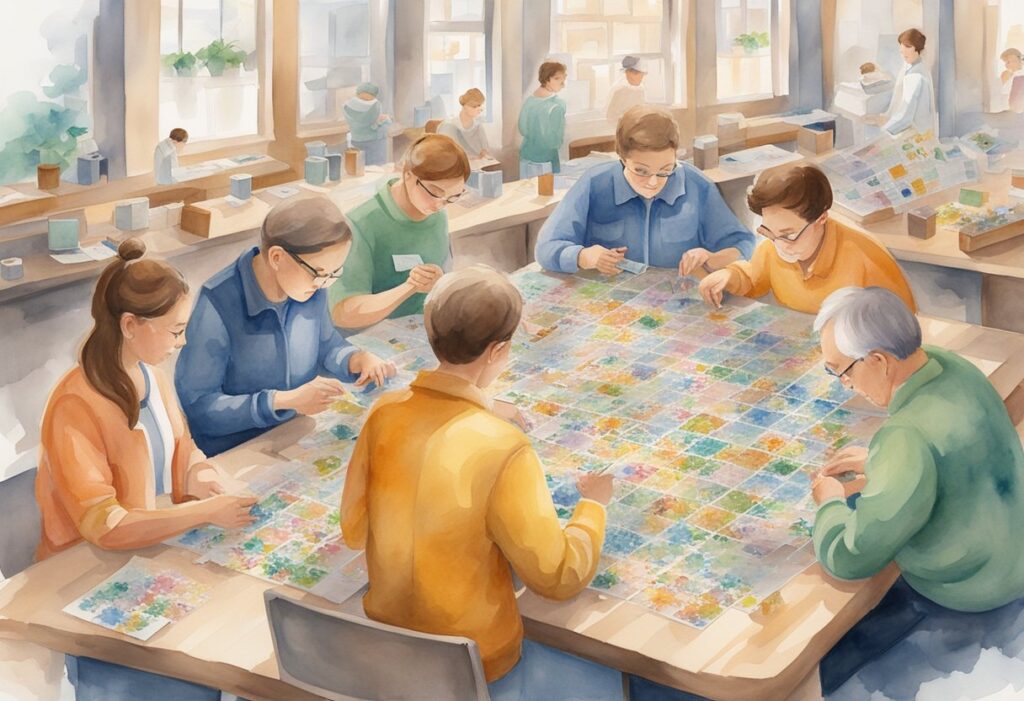Last Updated on March 18, 2024 by JigsawPuzzleGuru
Table of Contents
Strategies: How to Win with Skill and Speed
A Jigsaw puzzle competition brings together individuals who share a passion for sorting, piecing together, and solving intricately designed puzzles under time constraints. These contests test participants’ problem-solving skills, pattern recognition, and spatial reasoning. Competitors range from amateur enthusiasts to professional puzzle solvers, with events varying in size, from local community gatherings to large international championships.
In each event, competitors are typically given the same puzzle, which they must complete in the shortest time possible. The designs of these puzzles can feature anything from simple and recognizable images to complex and abstract patterns, increasing the difficulty and intensity of the competition. Many competitions also include different categories based on puzzle size and complexity, catering to varying levels of skill and experience.
The sense of community at these competitions is palpable, as puzzlers share strategies, experiences, and the simple joy of contributing one’s final piece to a collective effort. Scoring is usually clear-cut, with the fastest completion times determining the winners, though some contests may have additional criteria such as technique or the fewest errors made during assembly. Participants often practice for months, honing their skills and speed, all leading up to moments of intense concentration and the satisfaction of seeing a puzzle come together piece by piece.
History of Jigsaw Puzzle Competitions
Competitive jigsaw puzzling has a structured history with organizations like the World Jigsaw Puzzle Federation and the USA Jigsaw Puzzle Association spearheading organized events and championships, bringing together enthusiasts and professional puzzlers alike.
World Jigsaw Puzzle Federation
The World Jigsaw Puzzle Federation (WJPF) is an international organization that oversees international competitions. It is known for organizing the World Jigsaw Puzzle Championship, a significant event in the competitive puzzling calendar. This championship takes place in Valladolid, Spain, a city known for its embrace of the jigsaw puzzle community. The WJPF aims to standardize rules and regulations for competitions worldwide, providing a framework for puzzle challenges that ensures fairness and consistent judging criteria.
- Location: Valladolid, Spain
- Event: World Jigsaw Puzzle Championship
USA Jigsaw Puzzle Association
In the United States, the USA Jigsaw Puzzle Association is a recognized body that conducts national competitions. One such noteworthy event is the USA Jigsaw Nationals. The USA Jigsaw Puzzle Association coordinates these nationals, with recent events being held in cities like San Diego. Participants compete in various categories, ranging from individual to team events, and the winners often have the opportunity to represent the U.S. at international competitions, including events at the Millennium Dome.
- Notable Event: USA Jigsaw Nationals
- Recent Venue: San Diego
- International Representation: Millennium Dome
The history of these competitions is marked by a growing community of jigsaw puzzle enthusiasts who participate in regional, national, and international events, showcasing their skills in assembling puzzles with speed and precision.

Are you ready to embark on a year-long journey through the captivating world of puzzles?
Join our 52-Week Jigsaw Puzzle Challenge and receive a new puzzle challenge in your inbox every week!
Types of Competitions

Jigsaw puzzle competitions cater to a varied audience, from solo enthusiasts to collaborative groups. The events are structured to challenge different participant configurations, whether individual contenders or collective teams.
Individual Events
Individual events test the puzzle-solving skills of a single participant. Contestants are each given an identical puzzle and race against the clock to complete it. The USA Jigsaw Puzzle Nationals often showcases individual talent, where precision and speed are essential to securing victory. Competitors in individual categories are evaluated on factors such as time taken to complete the puzzle and the accuracy of their assembly.
Pairs and Teams Events
In Pairs and Teams Events, participants join forces to tackle puzzles. These competitions promote teamwork and collaborative problem-solving strategies. The World Jigsaw Puzzle Championship, for instance, is renowned for its team events, where groups of puzzlers work in concert to construct complex images. Teams can vary in size, but commonly consist of:
- Pairs Events:
- Two participants
- Coordination and communication are pivotal
- Teams Events:
- Three or more participants per team
- The dynamic of the group and role allocation impacts performance
These events are not only a test of jigsaw puzzle prowess but also of the participants’ ability to synergize their efforts.
Key Competitions Around the World

Jigsaw puzzle enthusiasts compete globally, showcasing their skills in tournaments known for their intense competition and camaraderie. Two landmark events stand out: the World Jigsaw Puzzle Championship and the USA Jigsaw Puzzle Nationals.
World Jigsaw Puzzle Championship
The World Jigsaw Puzzle Championship is held annually in Valladolid, Spain. This prestigious event attracts participants from around the globe, where teams work meticulously to complete uniquely designed puzzles within a specified time. The competition consists of various categories, including individual and team challenges, and caters to all age groups. Notably, Valladolid serves as a vibrant host city, providing a historic and cultural backdrop to the mental athleticism on display.
USA Jigsaw Puzzle Nationals
Taking place in the Hilton San Diego Mission Valley, the USA Jigsaw Puzzle Nationals gathers some of the most skilled puzzle constructors in the United States. During the event, competitors are tasked with assembling puzzles as quickly as possible in both individual and team categories. The Hilton San Diego Mission Valley offers a comfortable and accommodating venue for the national contenders, making San Diego not just a competition site but a destination for puzzle lovers.
Rules and Regulations

Competitive jigsaw puzzling, governed by organizations such as the World Jigsaw Puzzle Championship (WJPC) and the USA Jigsaw Puzzle Association (USAJPA), adheres to standardized rules and regulations to ensure fair and uniform gameplay.
Puzzle Format and Pieces
- Size and Complexity: The puzzles used vary in size and complexity, typically ranging from 500 to 5000 pieces.
- Quality: Pieces must be in good condition with no modifications.
Competition Rules
- Start: All participants begin at the same time with puzzles turned face down.
- Handling: Only one piece may be handled at a time.
- Placement: Pieces must be interlocked to count.
- No Forced Fits: Participants cannot force pieces into place.
Timing and Scoring
- Clock: A central clock monitors the time.
- Completion: First to finish or most pieces connected when time runs out wins.
- Tie Breakers: In the event of a tie, time taken to reach the tied position is considered.
Behavior and Fair Play
- Respect: Competitors must respect fellow puzzlers and officials.
- Interference: No interference with other competitors’ puzzles is allowed.
- Assistance: No external help is allowed; this includes electronic devices or assistance from the audience.
Organization Rules
- WJPC and USAJPA: Both have unique but similar sets of rules that participants must follow.
- Registration: Participants typically must register through the official channels.
- Categories: Various categories may be available based on age, team size, and puzzle difficulty.
Adherence to these regulations ensures a fair and competitive environment that is respected on an international level. Participants are encouraged to familiarize themselves with the full rule set provided by the respective organizations before competing.
Competition Structure
Jigsaw puzzle competitions are meticulously organized to test the speed, skill, and teamwork of the participants. They typically consist of a series of qualifying rounds followed by a final round to determine the ultimate champions.
Qualifying Rounds
During the qualifying rounds, teams are given puzzles of varying complexity and size. Each round is timed, and the objective for each team is to complete their puzzle as quickly as possible. Points are awarded based on the completion time, with faster teams receiving more points.
- Round 1: Puzzles with 250 pieces, 45 minutes limit
- Round 2: Puzzles with 500 pieces, 60 minutes limit
- Round 3: Puzzles with 750 pieces, 75 minutes limit
Teams must accumulate points over these rounds to advance to the final. The number of teams advancing depends on the size of the initial competitor pool.
Final Round
The final round is composed of the highest-scoring teams from the qualifiers. Here, competitors face their most challenging puzzle yet: often exceeding 1000 pieces. The time allocated for this round is typically 120 minutes. The team that completes the puzzle correctly in the shortest amount of time within this period is declared the winner. In the event of a tie, the total time taken in previous rounds is considered to determine the final standings.
Preparing for a Jigsaw Puzzle Competition
Success in jigsaw puzzle competitions often hinges on two critical areas: effective practice techniques and a thorough understanding of the puzzle types used in these events. Both areas require a strategic approach to master the skills needed for competition.
Practicing Techniques
Daily Puzzling: A competitor should establish a daily practice routine with varying puzzle sizes and difficulties to enhance their shape recognition and sorting skills.
- Speed Building: They can time their sessions to track improvement.
- Sorting Strategies: Creating a system for sorting pieces by color, edges, patterns, and shapes can expedite the puzzle-solving process.
Handling Pieces: Delicate handling of the pieces ensures they fit smoothly and reduces the chance of damage, which could affect the puzzle’s integrity.
Understanding Competition Puzzles
Puzzle Types: Competitors must familiarize themselves with standard jigsaw puzzles used in competitions, which often vary in piece count and complexity.
- Standard Grid Cut: Puzzles with pieces cut in a regular grid pattern are common and predictable, making them good practice material.
- Irregular Cut: Puzzles with irregularly shaped pieces present a greater challenge and require a more nuanced approach.
Study Past Competitions: Reviewing puzzles from past events can give competitors insight into the styles and themes commonly selected by organizers. They can study:
- The color schemes
- The complexity of images
- Piece size variations
Community and Social Aspects
Jigsaw puzzle competitions foster a vibrant community characterized by active social engagement and event participation. These gatherings are not just about the puzzles but also the connections and experiences shared among enthusiasts.
Social Media Engagement
The jigsaw puzzle community thrives on social media platforms where participants share their achievements, tips, and puzzle-related content. Facebook groups, Instagram accounts dedicated to puzzling, and Twitter hashtags like #jigsawpuzzle bring together individuals from across the globe. For example, Instagram features accounts such as @karenpuzzles, with thousands of followers, where users interact by commenting on and liking images of completed puzzles and progress updates.
Puzzle Community Events
Events play a pivotal role in uniting puzzle enthusiasts. Competitions are held at various levels, ranging from local meetups to international championships. One notable event is the World Jigsaw Puzzle Championship, attracting competitors from different countries. These events often feature:
- Competitive Puzzling: Timed contests to complete puzzles the quickest.
- Workshops: Sessions to learn new techniques or about puzzle history.
- Social Mixers: Informal gatherings to discuss puzzling and network.
Local community centers and libraries may also host puzzle swaps or casual get-togethers, providing an avenue for individuals to connect and share their passion for puzzles.
Virtual Competitions
During the pandemic, the popularity of virtual jigsaw puzzle competitions soared. Competitors participate from the comfort of their homes, connecting through online platforms. Organizers utilize webcameras to ensure that participants adhere to rules and that the puzzles are completed without assistance.
Virtual competitions offer several formats:
- Timed Solos: Individuals race against the clock to complete a puzzle.
- Team Challenges: Groups work together, collaborating online to fit pieces quickly.
- Live Streams: Participants share their progress in real time, often with a spectator audience.
Participants must have a stable internet connection and a camera with clear resolution. The camera serves two functions:
- Verification: It confirms the puzzle’s starting state and the contestant’s ongoing work.
- Engagement: It allows viewers to watch the puzzle being solved, enhancing the interactive experience.
The table below outlines the requirements for virtual jigsaw puzzle competitions:
| Requirement | Description |
|---|---|
| Reliable Camera | Essential for monitoring progress and verifying completion. |
| Internet Access | Competitors need a fast and stable connection. |
| Puzzle Software | Some events may use digital puzzles instead of physical ones. |
| Registration | Participants often need to sign up through an online portal. |
These competitions operate under strict guidelines to preserve the integrity of the sport. Judges can disqualify any contestant if they suspect cheating or if technical issues prevent proper observation. Despite the challenges, virtual jigsaw puzzle competitions have enabled enthusiasts to compete internationally without the need for travel, fostering a global community of puzzle lovers.
Event Highlights
The jigsaw puzzle competition was a display of rapid problem-solving and luck, accentuated by the anticipation of the prize drawings and the excitement of the speed puzzling rounds.
Speed Puzzling
Contestants face off in a test of dexterity and wit, where each participant was given the same 500-piece puzzle to complete. Each swift assembly of pieces is met with cheers as onlookers witness the intense focus and speed of the competitors.
Prize Drawings
The excitement peaks during the prize drawings, where every contestant had a chance to win regardless of their puzzle-solving speed. Prizes ranged from exclusive jigsaw puzzles to a variety of puzzle paraphernalia. Attendees also usually receive a swag bag filled with puzzle-themed items such as:
- Custom puzzle coasters
- A puzzle-solving tips booklet
- A discount voucher for their next puzzle purchase
These drawing sessions added an element of chance and fortune to the atmosphere, balancing the scales between the speed puzzlers and those participating for fun.
Registration and Participation
The process of registration for a jigsaw puzzle competition requires participants to complete a few essential steps. Interested parties should first check the eligibility criteria to ensure they meet the age and skill requirements.
Registration typically opens several weeks prior to the event and can be done through:
- Online forms on the event’s official website.
- Email submissions with necessary details as specified by the organizers.
- In-person registrations at designated locations.
Required information may include:
- Participant’s full name.
- Contact details (email and phone number).
- Preferred competition category.
After submission, a confirmation email is sent confirming participation status. Additionally, members may be required to pay a registration fee, details of which are provided during the sign-up process.
| Registration Step | Description |
|---|---|
| Check Eligibility | Verify age and skill level requirements. |
| Choose Registration Mode | Online, email, or in-person options. |
| Provide Information | Full name, contact details, category choice. |
| Confirmation | Wait for an email confirming participation. |
| Fee Payment | Complete any necessary payments. |
Participants are advised to register early as some events have a cap on the number of entries. Moreover, a registered member might need to check in at the event at a specified time to secure their spot in the competition. They should keep an eye on their email for updates on event details and any changes in the schedule or rules.
Frequently Asked Questions
What is a jigsaw puzzle competition?
A jigsaw puzzle competition is an event where individuals or teams compete to complete a puzzle in the shortest amount of time. These puzzles vary in complexity and size.
Who can participate in these competitions?
Anyone with an interest in puzzles can participate. Competitions often have categories based on age and skill level.
What are the common rules?
- The puzzle must not be started until the official start time.
- No piece may be modified to fit.
- The puzzle is considered complete when all pieces are correctly assembled.
How are winners determined?
Winners are determined by the completion time. If there’s a tie, the quality of the puzzle assembly may be considered.
Are there any tips for competitors?
- Familiarize oneself with the puzzle pattern.
- Sort pieces by color and edge pieces.
- Develop a strategy for assembly.
Is there a fee to enter?
Competitions may have an entry fee. Check with the event organizer for specifics.
Where do competitions take place?
They occur in various venues, from local community centers to international events.
What are the prizes?
Prizes vary, but may include cash, trophies, puzzles, or certificates.
To find out more about a specific competition, its rules, entry fees, or prizes, prospective participants should contact the organizers directly.
The Future of Jigsaw Puzzle Competitions
Technology Integration The arena of jigsaw puzzle competitions is rapidly embracing technology. Digital platforms are expected to host virtual events, enabling global participation. This shift not only expands the audience but also introduces new formats and interactive features that enhance the experience both for competitors and spectators.
Diversity of Puzzles Manufacturers are likely to produce puzzles with increased complexity and variety, offering a wide spectrum of themes and difficulty levels. This diversification will challenge competitors and potentially attract participants from various age groups and skill levels.
- Educational Partnerships
- Collaborations with educational institutions
- Development of curriculum-based puzzle competitions
- Focus on cognitive benefits
Accessibility and Inclusion Efforts will likely be made to ensure puzzle competitions are accessible to all, with adaptive puzzles and accommodations for participants with disabilities. This inclusivity solidifies the sport’s community-centric nature and encourages wider participation.

